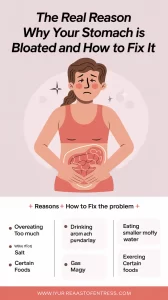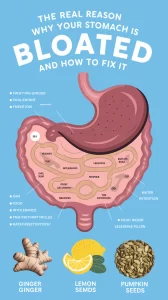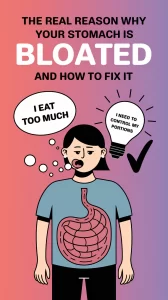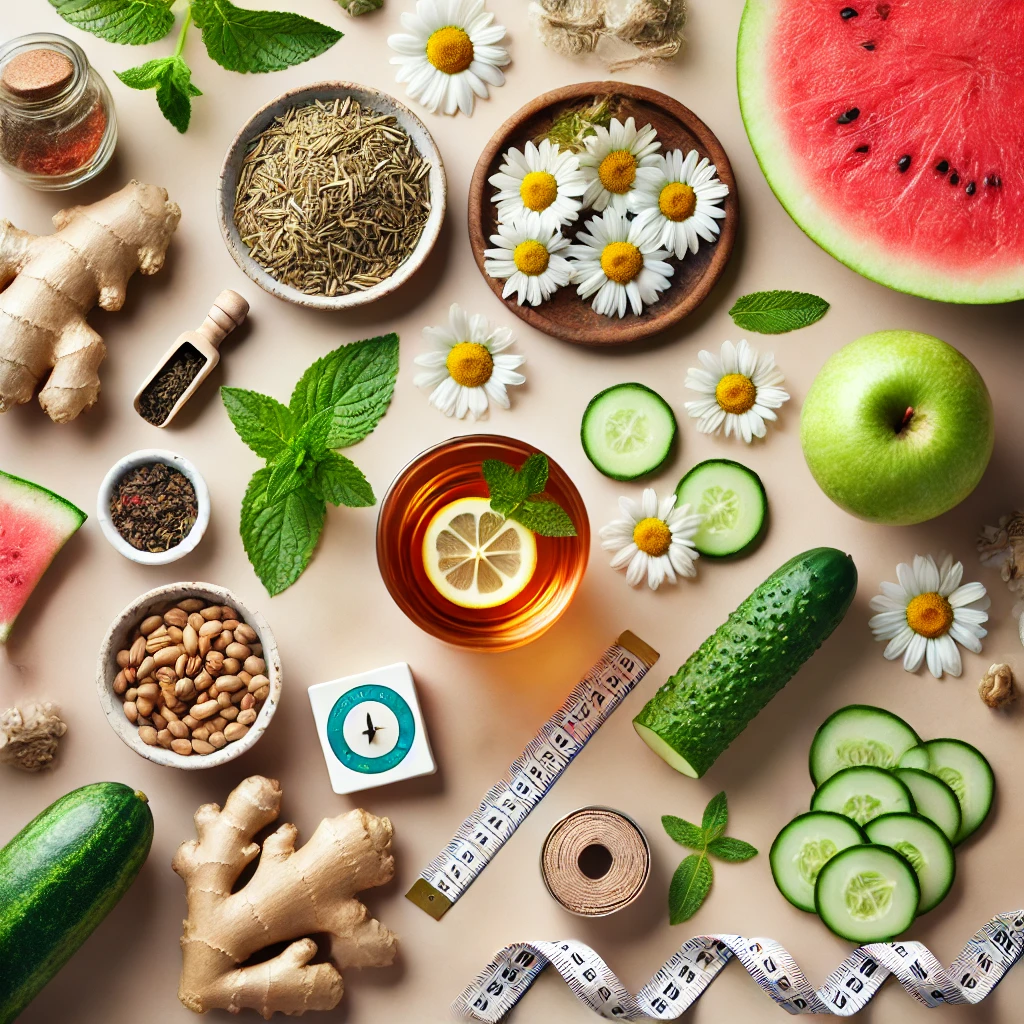Bloating can be uncomfortable and frustrating, affecting your confidence and daily activities. While it’s a common issue, understanding its underlying causes and how to address them can help you find relief. Here’s a comprehensive look at why your stomach may be bloated and effective solutions to alleviate the discomfort.

1. What Causes Bloating? 🤔
Bloating can result from various factors, including:
- Dietary Choices: Certain foods can cause gas and bloating. Common culprits include:
- Beans and Legumes: High in fiber and difficult to digest.
- Cruciferous Vegetables: Such as broccoli, cauliflower, and Brussels sprouts.
- Dairy Products: For those who are lactose intolerant.
- Carbonated Drinks: Bubbles can lead to gas buildup.
- High-Sodium Foods: Can cause water retention.
- Overeating: Consuming large meals can stretch the stomach, leading to a feeling of fullness and discomfort.
- Swallowing Air: Eating too quickly, drinking through a straw, or chewing gum can cause you to swallow excess air, resulting in bloating.
- Digestive Disorders: Conditions such as irritable bowel syndrome (IBS), celiac disease, and gastroesophageal reflux disease (GERD) can lead to bloating and other digestive issues.
- Hormonal Changes: Fluctuations in hormones during menstruation or pregnancy can cause water retention and bloating.
2. How to Fix Bloating 🌟

Here are some effective strategies to reduce and prevent bloating:
A. Dietary Adjustments 🍽️
- Identify Trigger Foods: Keep a food diary to track what you eat and note any bloating symptoms. Eliminate or reduce foods that consistently cause bloating.
- Eat Smaller Meals: Instead of large meals, opt for smaller, more frequent meals to reduce stomach stretching.
- Stay Hydrated: Drinking plenty of water helps with digestion and can prevent constipation, which contributes to bloating.
- Limit Salt Intake: Reducing your sodium intake can help minimize water retention.
B. Mindful Eating 🧘♀️
- Eat Slowly: Take your time when eating, and chew your food thoroughly to minimize air swallowing.
- Avoid Carbonated Beverages: Opt for still water or herbal teas to reduce gas.
C. Herbal Remedies 🌿
- Peppermint Tea: Known for its soothing properties, peppermint can help relax the digestive tract and reduce bloating.
- Ginger: Consuming ginger tea or adding fresh ginger to meals can aid digestion and alleviate gas.
- Chamomile Tea: This gentle herb can help relax the digestive system and reduce inflammation.
D. Exercise and Movement 🏃♂️
- Regular Physical Activity: Engaging in activities like walking, jogging, or yoga can help stimulate digestion and reduce bloating.
- Gentle Stretches: Incorporating stretches specifically for the abdominal area can help relieve discomfort.
E. Consult a Healthcare Professional 👩⚕️
If bloating persists or is accompanied by severe pain, weight loss, or changes in bowel habits, consult a healthcare professional. They can help identify underlying conditions and provide tailored treatment options.
3. When to Seek Help 🩺
- Severe or Persistent Bloating: If bloating lasts for several days or is accompanied by intense pain, fever, or vomiting, it’s important to seek medical attention.
- Changes in Bowel Movements: If you notice persistent diarrhea or constipation along with bloating, consult a healthcare professional for evaluation.
Conclusion
Bloating can be a troublesome and uncomfortable experience, but understanding its causes and implementing effective strategies can lead to relief. By making dietary adjustments, practicing mindful eating, and staying active, you can minimize bloating and enjoy a more comfortable life.

Don’t let bloating hold you back—take charge of your digestive health today! 🌿💧



